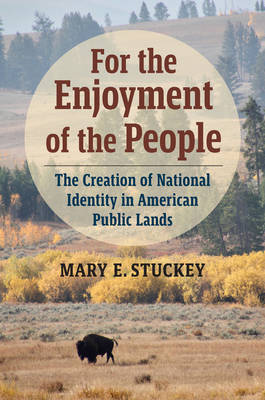
- Retrait gratuit dans votre magasin Club
- 7.000.000 titres dans notre catalogue
- Payer en toute sécurité
- Toujours un magasin près de chez vous
- Retrait gratuit dans votre magasin Club
- 7.000.0000 titres dans notre catalogue
- Payer en toute sécurité
- Toujours un magasin près de chez vous
For the Enjoyment of the People
The Creation of National Identity in American Public Lands
Mary E StuckeyDescription
National parks are widely revered as "America's best idea"--they are abundantly popular and remarkably noncontroversial in the United States. American presidents use these parks to stake their claims to environmentalism, assert a singular national history, and define a unified national identity, often doing so inside the parks themselves. However, the establishment and history of almost every national park has been riddled with conflict over competing claims to land, knowledge, and economic interests. Like any major area of public policy, the fissures present in debates over the national parks also represent important fracture lines in the public understanding of the meaning of America and of individual claims to citizenship. The park system, in other words, does a lot of political work for both presidents and the mass public, even though much of that work goes largely unnoticed. This book explores that political work by addressing themes of national origins and the dispossession of Indigenous peoples; monuments to the national past, heritage, and the assertion of a national narrative; environmentalism and natural resources; and exploitation of the national landscape for economic gain.
In For the Enjoyment of the People, Mary Stuckey looks at the politics of the parks as well as what the parks can teach us about citizenship and what it means to be American. Stuckey asserts that through the national parks we can hope to explain the past, clarify the present, and project the future. Combining interdisciplinary conversations about tourism, public memory, national history, park history, the presidency, and national identity, Stuckey contributes insightful ideas to the conversation on the history of national parks while examining the natural, military, and patriotic nature of America's best idea.
Spécifications
Parties prenantes
- Auteur(s) :
- Editeur:
Contenu
- Nombre de pages :
- 304
- Langue:
- Anglais
Caractéristiques
- EAN:
- 9780700634798
- Date de parution :
- 25-07-23
- Format:
- Livre relié
- Format numérique:
- Genaaid
- Dimensions :
- 156 mm x 234 mm
- Poids :
- 430 g

Les avis
Nous publions uniquement les avis qui respectent les conditions requises. Consultez nos conditions pour les avis.






